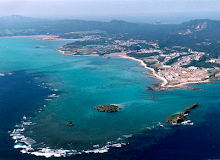Close the Futenma Air Station immediately with no strings attached
Submitted to The New York Times September 16, 2011; The Japan Times September 20, 2011; The Washington Post September 26, 2011
Albeit knowing there's a strong local opposition, Washington cunningly cajoled Tokyo into agreeing to relocate the Futenma Air Station to Henoko, Nago in northern Okinawa. It was a government-to-government agreement and so Tokyo has every bit of international obligation to carry out the agreed-upon relocation plan as soon as possible, insists Washington.
Less than two months ago, former Defense Minister Toshimi Kitazawa and the newly appointed U.S. Defense Minister Leon Panetta reaffirmed that "Tokyo and Washington will move forward with the plan to relocate the controversial Futenma base within Okinawa."
Last week (September 7), the Noda cabinet's newly-installed Foreign Minister Koichiro Gemba made an inaugural telephone call to U.S. Secretary of State Hillary Clinton in which he assured her that Japan would "stick to the accord reached last year to relocate" Futenma to Henoko.
Gemba also said at his inaugural news conference that he would do his best to persuade Okinawa residents to accept the bilateral accord. How would he do it? By lavishly bribing Henoko, Nago City residents into consenting? Or else, Tokyo would probably have to resort to police force, invoking state power and thus causing bloodshed and social turmoil. By coercing Tokyo this way, Washington is actually instigating these dirty tactics, and would repeat its stock phrase: "It's Japan's domestic problem that has nothing to do with the U.S." A great democracy, indeed.
The meeting in New York on Wednesday (September 21) between Japan's new Prime Minister Toshihiko Noda and U.S. President Barack Obama on the sidelines of the U.N. General Assembly session was the culmination of an array of such reassurance and confirmations. Noda assured Obama that he would do his utmost to implement the 2006 accord between Tokyo and Washington.
Futenma was constructed toward the end of WW II with an aim of attacking mainland Japan by B-29's in order to end the war quickly. But the war ended before that plan was actually carried out. Futenma should have been returned at that point; instead, it has continued to be in the firm grip of the U.S. military all these years to this day.
The U.S. military seized the land in clear violation of Article 46 of the Hague Convention, which states: "Family honour and rights, the lives of persons, and private property, as well as religious convictions and practice, must be respected. Private property cannot be confiscated."
There are more than 3 thousand so-called "military-land owners" for the Futenma Air Station. This figure tells everything about its history, that is, how it came into being. Futenma was constructed, while area residents were still herded into concentration camps during the ongoing Battle of Okinawa and after in the freely encroached-upon area where there were five idyllic villages with a joint population of more than 12 thousand.
Other U.S. bases in Okinawa, 33 in all, have more or less a similar history. In the 1950's additional land was requisitioned at bayonet point and by bulldozer to expand already existing bases. Take Iejima, for instance. Jon Mitchell writes in his recent article in The Japan Times: "With all of Okinawa under U.S. administration, the authorities started by tricking the landowners (in Iejima) into signing voluntary evacuation papers... But then, when some families refused to leave, 300 U.S. soldiers with rifles and bulldozers dragged women and children from their beds, tore down their homes and slaughtered their goats." ("Iejima: an island of resistance," May 22, 2011 Japan Times)
The illegality and immorality of Futenma would not disappear even if it were to be moved to Henoko or anywhere else in Okinawa just like dirty money would not become clean how many times it might undergo laundering.
Both governments, especially Washington, must realize this and search for an alternative solution, that is, to move it outside of Okinawa, most preferably, to the U.S. mainland. The Marines themselves may have known the criminality of their base, for they already had a blueprint for constructing a new base in Henoko in the 1960's which is strikingly similar to today's relocation plan.
I repeat: Close the Futenma Air Station immediately with no strings attached. Move it to the U.S. mainland. There's no obligation for the Japanese taxpayers, Okinawa residents in particular, to foot all the bills for reclaiming the pristine coastal waters off Henoko and constructing a new, advanced base complex including military port facilities for the U.S. Marines.
Yoshio Shimoji
Naha City, Okinawa
Japan
Sunday, October 2, 2011
Subscribe to:
Comments (Atom)






